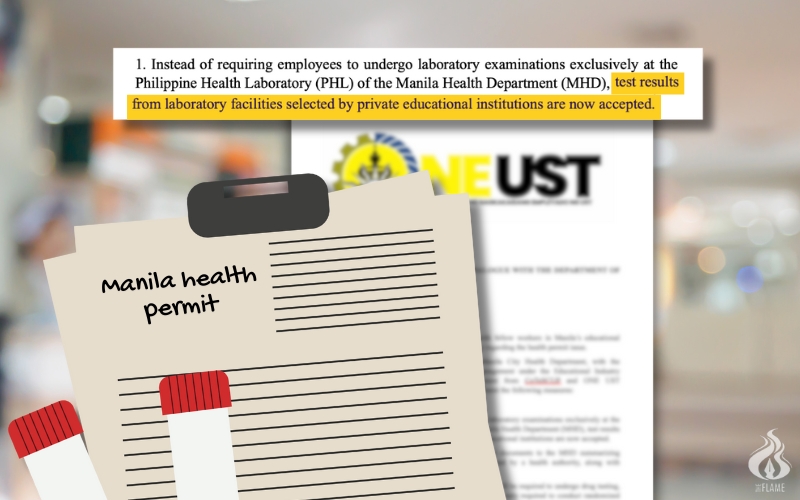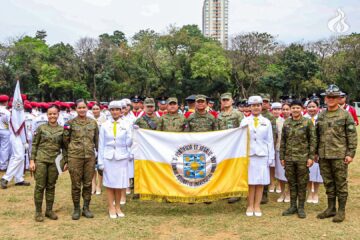
THE MANILA Health Department has agreed to allow all private educational institutions to undergo laboratory examinations from other medical facilities for its health permit requirement, which has drawn sharp criticism from workers for supposedly being “restrictive” and “redundant,” UST’s labor coalition said.
In a report on its dialogue with Manila health officials last Sept. 9, Organisasyon ng Nagkakaisang Empleyado-UST (ONE-UST) said the city health office would now recognize laboratory test results from health services selected by the private school.
Initially, employees were required to undergo physical examinations at the Manila public health laboratory to secure a health certificate that costs P625.
“Instead of requiring employees to undergo laboratory examinations exclusively at the Philippine health laboratory of the Manila Health Department, test results from laboratory facilities selected by private educational institutions are now accepted,” ONE-UST said in a report dated Sept. 10.
The report was signed by UST Faculty Union president Asst. Prof. Emerito Gonzales, Samahang Manggagawa-UST president Dan Paul Patricio, Ugnayan ng Nagkakaisang Manggagawa-UST Hospital president Donell John Siazon and Arts and Letters Faculty Association president Assoc. Prof. Rene Luis Tadle.
City government officials led by Manila Health Department Director Arnold “Poks” Pangan, Sanitary Inspection Unit Head Manny Taguba District 4, Councilor Louisito Chua, the author of the ordinance, and labor sector representatives attended the meeting.
According to the ONE-UST report, school employees are required to submit official documents containing the laboratory test results and receipt of compliance with random drug testing, which must be signed by a health authority, to the Manila Health Department. New job applicants, however, must undergo mandatory drug testing.
Previously, the local government required that the laboratory tests for the issuance of a health permit be conducted at the city’s public health laboratory. However, the city’s facilities have been described by several employees as “inconvenient” and “below average.” Critics have also assailed the cost of health procedures that allegedly “exploit” workers.
Manila Mayor Honey Lacuna, also Pangan’s wife, broke her silence on the issue in a press briefing late last month when she claimed that the criticisms against the requirement may have stemmed from the UST administration’s failure to relay the policy properly to its workers.
“I think it was from the way the UST administration explained things to them that the problem arose. Misunderstanding. Maybe if that hadn’t happened, implementation would have gone smoothly,” Lacuna told reporters last Aug. 27.
Last Monday, UST Rector Fr. Richard Ang, O.P. said the health permit issue is “over” and that the University has already “patched things up.”
“Let us not talk about [Manila Mayor Honey Lacuna] because that issue is over. So, we will not discuss anything which is sensitive or controversial today. So, let’s leave it like that because we already patched things up so we don’t want to continue this discourse regarding that one,” Ang told The Flame in an interview.
Dialogues with UST employees are still “ongoing,” the rector added.
In a speech delivered during his installation as UST’s 97th rector, Ang said the University cannot fight the Manila local government and that it would support the health certificate requirement.
ONE-UST said that the Manila Health Department would release a clarificatory memorandum to formalize the amendment. The city health office also vowed to continue participating in regular dialogues with academic officials and labor representatives, the labor coalition added.
According to ONE-UST, the amendment serves as a “significant step forward” to all workers who fought and challenged the ordinance and proves that “oppressive” and “unreasonable” laws can be modified “not through blind compliance or complicity, but through critical dialogue and resistance.”
“We extend our gratitude to our colleagues who took a principled stance against Manila Ordinance 8793, even at the risk of their livelihood. We also thank those who voiced their indignation over the physical and mental pressures they faced in complying with a requirement they deemed unreasonable and oppressive. Your determination drove us to continue this advocacy,” the labor coalition said.
“Yes, we have the right to hold accountable those who should have acted better but didn’t. However, this experience also teaches us that mere words about compassion, competence, commitment, and collaboration—including courage—are meaningless unless we live them every day, even when it’s hard. Only then can we grow as a united Thomasian community,” it added. F



